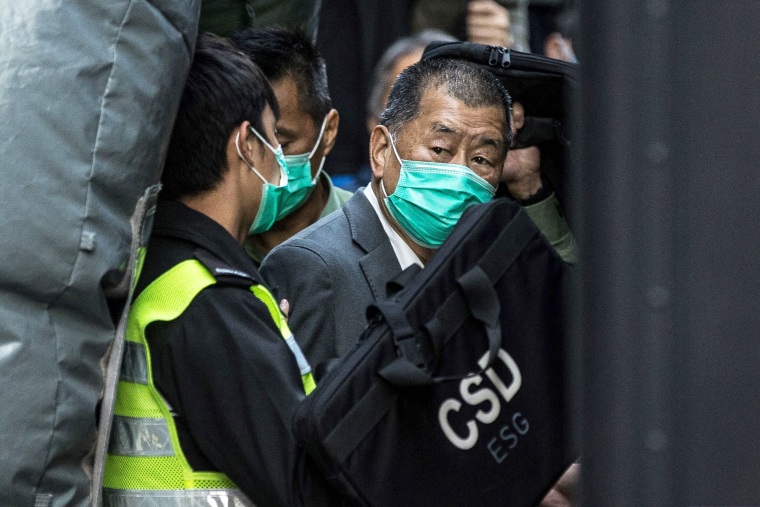HONG KONG — A Hong Kong court found media tycoon Jimmy Lai guilty of fraud Tuesday, the latest of myriad cases against Lai and other pro-democracy activists that critics say officials are using to stamp out dissent in the Chinese territory.
Lai, 74, the founder of the defunct pro-democracy tabloid Apple Daily, is among the most prominent activists to be prosecuted in the wake of anti-government protests that swept Hong Kong for months in 2019.
Lai, a British citizen, is already serving prison sentences for his role in unauthorized assemblies during the 2019 protests, as well as an unauthorized vigil in 2020 for victims of the 1989 Tiananmen Square crackdown.
District Court Judge Stanley Chan said Lai had concealed the fact that he was operating a consulting firm from the offices of Next Digital, Apple Daily’s parent company, in violation of its lease with a government-owned entity. Lai and co-defendant Wong Wai-keung, a former senior executive at Next Digital who was also convicted, both pleaded not guilty.
Lai is scheduled to be tried in December under a new national security law, accused of “colluding with foreign forces” and conspiracy to produce “seditious publications.” Lai, who is pleading not guilty, could face life in prison if he is convicted under the law, which Beijing imposed in 2020 in response to the protests.
Six other former employees of Apple Daily and Next Digital are expected to plead guilty in the case, which will be heard by three handpicked judges rather than a jury.
Critics say the national security law has greatly eroded civil liberties in Hong Kong, the preservation of which had been promised for 50 years when the former British colony was returned to Chinese rule in 1997. Officials say the law was necessary to restore order after the protests.
Lai’s supporters have said he is being targeted for his journalism and called for the charges against him to be dropped.
Mark Clifford, a former board director of Next Digital and president of the Washington-based Committee for Freedom in Hong Kong Foundation, called the fraud verdict “outrageous.”
“What set Hong Kong apart was its rule of law and a sense of fairness and justice,” he told NBC News. “This really signals that it’s the beginning of the end, that rule of law in Hong Kong is under severe attack.”
Officials in Hong Kong strongly deny that its courts have become politicized, saying judicial independence and press freedom are protected under the Basic Law, the city’s mini-constitution.
Advocacy groups like Reporters Without Borders say Hong Kong has experienced a dramatic decline in press freedom since the national security law was enacted, falling from 80th to 148th in the group’s World Press Freedom Index this year.
Since last year, the government has shut down Apple Daily and another pro-democracy newspaper, Stand News; pressured Hong Kong’s largest journalist group; and arrested journalists under national security and sedition laws. An annual survey by the Committee to Protect Journalists found that the number of Hong Kong journalists it considers unjustly imprisoned for their work rose from zero to eight in 2021.
